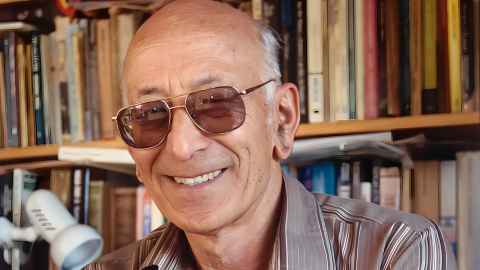Life and legacy of Emeritus Professor Ranginui Walker
09 September 2023
A feature documentary will air on Whakaata Māori during Te Wiki o Te Reo Māori, celebrating the life of Emeritus Professor Ranginui Walker.

Weaving together the remarkable life, values and motivations of one of Aotearoa New Zealand’s most fearless academics and activists is the new feature documentary, Being Māori: the Dr Ranginui Walker Story.
Emeritus Professor Ranginui Walker (Whakatōhea) is remembered as a rangatira, one of the most influential Māori academics and a leading advocate for Māori rights and social justice.
The documentary underscores his enduring impact on Māori rights and the legacy he left, says Adrenalin Group producer and director Bradley Walker.
“From the 1970s to the 2000s, he was a tireless advocate for Māori rights, social justice and cultural preservation.
“Narrated by his grandson, Dr Curtis Walker, the documentary paints a vibrant portrait of a man who was a pivotal figure in Māori history and who had a significant influence on the Māori rights movement's evolution."
The documentary explores the transformative impact of his work on Māori culture, education and identity and chronicle his relentless efforts to promote Māori rights and address social inequalities, while acknowledging the complexities of his role as a leader.
Professor Walker studied at Waipapa Taumata Rau, University of Auckland, gaining first a Diploma in Teaching, then a Bachelor of Arts in 1962, and a Master of Arts in 1966. In 1967 he took up a lectureship role in the Anthropology Department at the University where he completed his PhD in 1970.
He was educated at St Peter's Māori College in Auckland and trained first as a primary school teacher, working in that profession for 10 years.
Emeritus Professor Ranginui Walker (Whakatōhea) is remembered as a rangatira, one of the most influential Māori academics and a leading advocate for Māori rights and social justice.
He served at the Centre for Continuing Education in Auckland for 15 years and during this time, published numerous papers on Māori education and organised several Māori leadership conferences on urbanisation, gangs, Māori land, Māori fisheries, Māori educational development, and Māori representation in parliament.
He was also a member of the National Advisory Committee on Māori Education (NACME) from 1980 to 1984 and a member of the National and District Māori Council.
Dr Walker was appointed as Associate Professor of Māori Studies in the Anthropology Department in 1986, serving as a Professor of Māori Studies from 1993 to 1997 and then as Pro Vice-Chancellor Māori from 1996 to 1997.
As well as his numerous papers and book chapters, Professor Walker published six books: Nga Tau Tohetohe: The Years of Anger (1987); Ka Whawahi Tonu Matou: Struggle without End (1990); Nga Pepa a Ranginui: The Walker Papers (1997); He Tipua: The Life and Times of Sir Apirana Ngata (2001); Opotiki Mai Tawhiti (2007), and Paki Harrison: Tohunga Whakairo: The Story of a Master Carver (2008).
He was appointed a Distinguished Companion of the New Zealand Order of Merit in the 2001 New Year honours list, and in 2007, awarded the Te Tohu o te Māramatanga Research Excellence Award by Ngā Pae o te Māramatanga. He was appointed to the Waitangi Tribunal in 2003.
In 2009, Professor Walker received a Prime Minister's Literary Award and in 2012 was named a Distinguished Alumni by the University of Auckland.
He passed away in 2016 at 83.
Funded by Te Māngai Pāho, Being Māori: The Dr Ranganui Walker Story will premiere on Monday 11 September, the start of Te Wiki o Te Reo Māori, at 8.30pm on Whakaata Māori and MĀORI+.
Media contact
Te Rina Triponel | Kaitohutohu Pāpāho Māori
E: te.rina.triponel@auckland.ac.nz